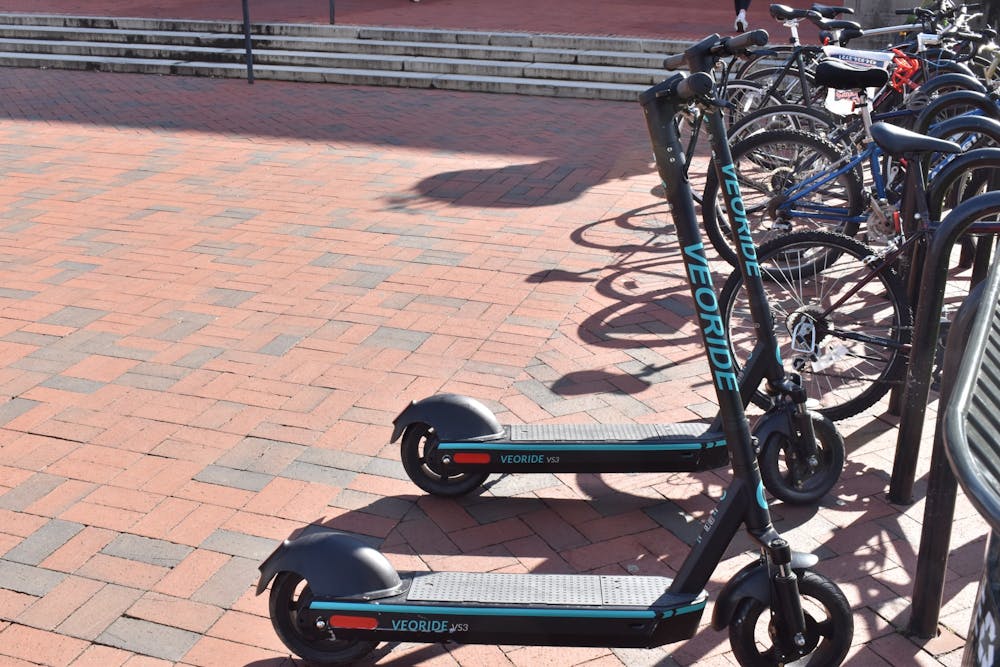When Lime announced this past December that it would no longer operate in Charlottesville, I was relieved. As a cyclist around Grounds, I have noticed an increasing number of students riding electric scooters dangerously, both for themselves and other individuals on the roads. Unfortunately, the removal of one electric scooter company did not cause the downfall of the e-scooter presence at the University. E-scooters remain an increasingly common sight around Grounds, ultimately to students’ detriment. As convenient and exciting as renting an e-scooter may be, they are fundamentally a danger both to their users and pedestrians — the city of Charlottesville should seek to ban them.
First, e-scooters are simply an eyesore. While cyclists and drivers are personally responsible for their vehicles, renters of e-scooters have a high incentive to simply dump them on the sidewalk or in the street. They clutter Grounds — if anything, they are a testament to the careless impulses of a young-adult brain. At a University that prides its beautiful campus, e-scooters add clunky, thoughtlessly strewn disruptions to that image, despite the myriad of alternative transportation students may use.
Further, e-scooters can cause problems for many students with disabilities at the University. Users often litter them on narrow sidewalks, which can be dangerous for students with vision impairment. Scooters are even more problematic for students who need to use mobility aids such as wheelchairs to navigate around Grounds, but find their path blocked by a heavy knocked-over scooter.
More seriously, e-scooters are particularly easy to use recklessly. With some scooters reaching a top speed of almost 20 miles per hour, e-scooters often travel far faster than cars and bicycles though pedestrian-heavy central Grounds and only slightly slower than cars in student housing areas nearby. E-scooters are also physically small enough that many users simply attempt to weave around pedestrians and cars. This places them at increased risk of hitting a pedestrian or being struck by a driver who cannot see and properly avoid something so small and so fast. While there have been some attempted regulations — such as prohibiting the scooters on sidewalks and on the Downtown Mall, as well as providing a few areas in which the scooters automatically slow down — there is still ample room for riders to behave badly. Not only are pedestrian collisions still possible in relatively light foot traffic, but no sources seem to define scooter speed limits, therefore placing the effectiveness of this regulation in question.
Frankly, most individuals who use e-scooters simply don’t know how to do so safely. E-scooters are faster, smaller and easier to find than any other transportation method on Grounds. As such, students with little understanding of the signals, speed and equipment required to use e-scooters safely often act in incredibly reckless ways. Further, there are few options to restrict individuals who may be intoxicated from using these scooters — they are cheap, left all over Grounds and student areas and easy to operate. Most troubling, this lack of oversight can have deadly consequences.
According to Quartz, at least 29 people have died in e-scooter crashes since 2018. With app-based e-scooters remaining a fairly new phenomena, one can only assume that this number will skyrocket as e-scooters become more and more ubiquitous across cities and towns worldwide. Even more disturbing, according to the data listed on Quartz, is that over half of the fatalities were young people between the ages of 16 and 30 — a demographic that meshes startlingly well with a university campus.
While obviously these scooters are fairly new — and therefore it is difficult to make firm conclusions based on collision data — there is still more than ample evidence that scooters ultimately pose more risk for harm than good to the University, its students and Charlottesville at large. With transportation services like UTS and CAT buses, UBike, Safe Ride and other ride-hailing apps, it makes little sense to place the safety of University students at risk — especially when it comes to transportation choices they may make when intoxicated or otherwise impaired. Therefore, while electric scooters are no doubt fun for many riders and provide a cheap, accessible form of transportation, the risks they carry to student safety simply aren’t worth the benefits — particularly considering the ample alternatives available. If the city of Charlottesville wishes to protect young people’s safety, those in power should take immediate action to revoke electric scooter companies’ contracts and advocate for safer transportation options.
Emma Camp is a Viewpoint Writer for The Cavalier Daily. She can be reached at opinion@cavalierdaily.com.
The opinions expressed in this column are not necessarily those of The Cavalier Daily. Columns represent the views of the authors alone.







